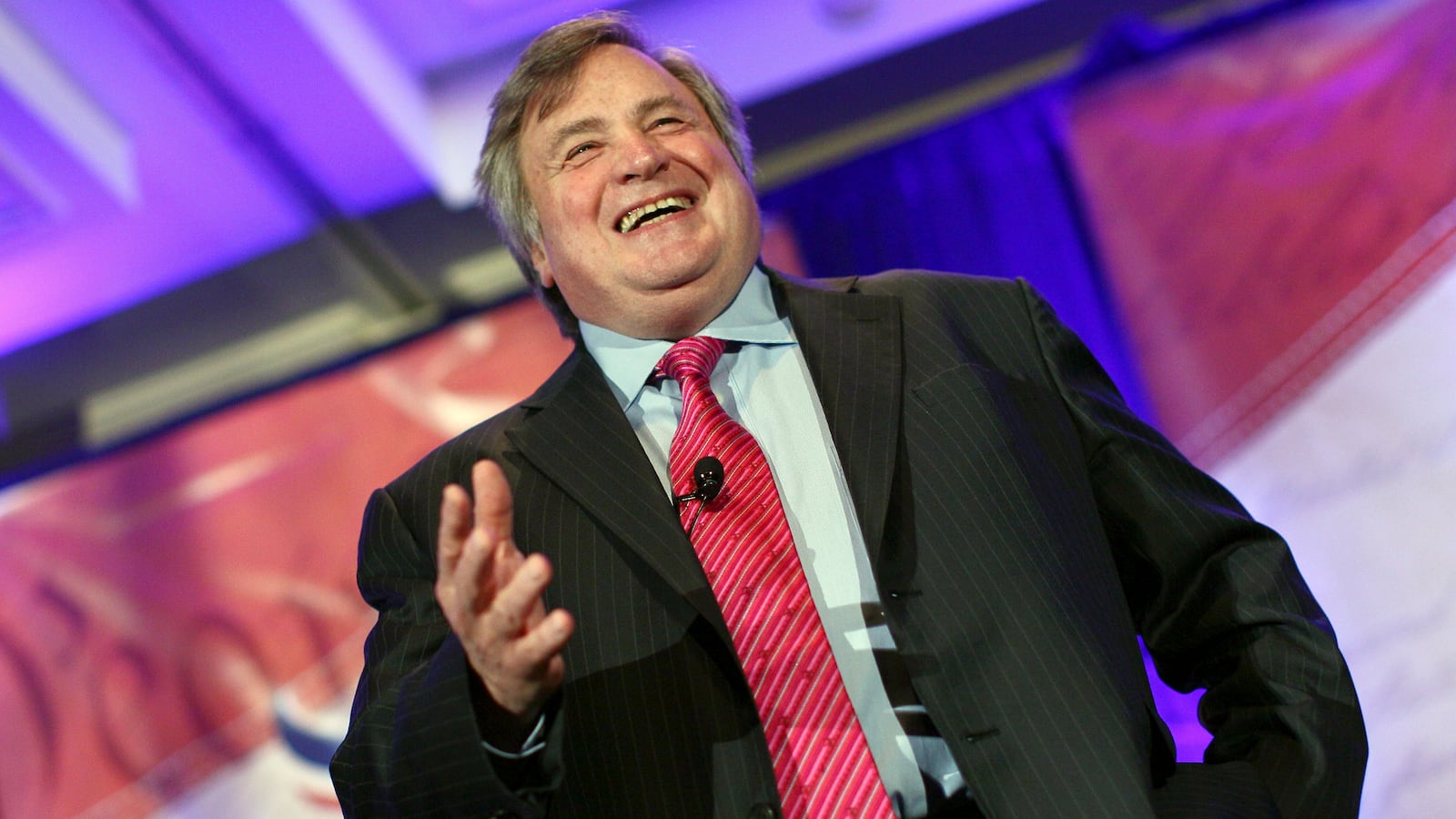That Fox News has dropped conservative commentator Dick Morris from his perch as a regular on-air presence caps a slow-but-steady fall from grace for the man whose raw political instincts were once the stuff of legend.

Long credited with steering President Bill Clinton toward the moderate, triangulating course that won him a second term in 1996 (just two years after Democrats took a historic beating in midterm elections), Morris stubbornly predicted a Mitt Romney landslide right up until Election Day this November, the polls be damned. But unlike Karl Rove, whose contract with the conservative network was renewed despite a bona fide on-air meltdown, Morris got the ax.
Which may speak less to his fatally flawed election handicapping and more to shady business practices like selling ads on his website to campaigns he discussed on the air, super-PAC fundraising that lined his own pockets, and the auction of a tour of Fox News’s studio at a local Republican Party fundraiser in Florida (for which he was reprimanded by network brass).
Before he was a wannabe conservative media tycoon, though, Morris was a Democrat. He got his start at New York City’s Stuyvesant High School in the early 1960s, when he managed eventual Manhattan Congressman Jerrold Nadler’s bid for class president. Back then Morris was far from the conservative firebrand we know today. One acquaintance recounted with amusement when Morris’s father had told him that a young Dick canvassed on behalf of the doomed presidential candidacy of liberal favorite Adlai Stevenson.
After graduating from Columbia, Morris went on to work closely with Clinton in Arkansas, including on his first gubernatorial campaign in 1978. He helped build the moderate image that the young pol would lean on as he urged the party toward Third Way centrism as head of the Democratic Leadership Council in the 1980s. Though Morris was not directly involved, his fingerprints were all over Clinton’s 1992 run for the White House, with its emphasis on his being “a different kind of Democrat,” as campaign ads intoned. Morris was never a committed partisan, taking jobs wherever they emerged, including a stint as adviser to the notorious race-baiting former Republican senator from North Carolina, Jesse Helms.
But it was when Clinton reached his low point around the time of the 1994 disaster that Morris caught his big break, working closely with the president—at first in secret, because he was also advising the congressional GOP—to turn back the tide of the Republican revolution.
“Democrats were in complete disarray,” says a top White House aide from that era. “The congressional leadership was utterly dysfunctional and in denial about the political mass suicide that they were committing.”
The president once again determined that he had to establish some distance from the Democratic Party of old, and Morris was the man to help him do it.
“He offered a fountain of tactical ideas at a time when the team that had brought Clinton into the White House was exhausted,” the aide said.
The emergence of Newt Gingrich as the public face (and congressional leader) of the conservative movement presented the perfect foil. Positioning himself as the reasonable alternative to a slash-and-burn ideologue intent on shutting down the government quickly paid dividends for the president, whose approval ratings soared. (A booming economy didn’t hurt, either.)
Riding high as the chief strategist of the president’s campaign ahead of the Democratic National Convention that summer, Morris was suddenly engulfed in scandal when the Star tabloid revealed his relationship with a prostitute named Sherry Rowlands. Morris’s alleged foot fetish might not have been fatal, but the news that he let Rowlands listen in on calls with the White House was too much to overcome.
Since his humiliating departure, Morris’s career is best understood as an extended project of revenge on the Clintons. By 1999, he was a Fox News contributor and New York Post columnist peddling ridiculous conspiracy theories about the first family and their associates. He suggested there was a secret White House police force out to get him (and other conservative critics) and that Hillary Clinton was a closet lesbian, among other gems.
Hurt feelings and a craving for cash helped establish Morris as a conservative force, even if he was never quite accepted by his new brethren as the genuine article.
“I find his ideological fervor completely phony,” says Roger Stone, a veteran GOP operative who worked for Richard Nixon and Ronald Reagan. “He believes in the ideology of money and any way he can get his hands on it.”
Stone, who once worked alongside Morris on a foreign consulting gig, describes him as something of an egomaniac whose influence with Clinton went to his head. He recalled an incident in a dentist’s office during Morris’s White House glory days when he apparently insisted that they hurry up because “I’m running the country!”
If Morris’s initial years as a conservative voice failed to deliver the prominence he desired, he hit his stride again when the right rose up in anger at the Obama presidency. As Media Matters reported, he partnered with Christopher Ruddy’s Newsmax website and email newsletter to endorse dubious schemes for contending with the looming financial apocalypse (which he hyped on the air) and used regular Fox News appearances to plug his website—which, in turn, grew his own email list and made him more money.
If Morris’s craven self-promotion occasionally raised eyebrows at Fox News—Brian Kilmeade, a network radio host, mocked Morris for his shamelessness on the air in 2010, and TV anchor Megyn Kelly made him sound like the joke of the newsroom this past November—ideological imperatives may also have played a role.
As Dave Weigel points out, Fox News and its parent News Corp. hail from the wing of the Republican Party committed to immigration reform and responding to the 2012 disaster with a new approach. In decades past, they might have turned to Morris to help right the ship. He’s led his share of improbable comebacks before. But a Tea Party favorite like Morris (or, for that matter, Sarah Palin, who also was dropped by Fox News as part of its post-election makeover), whose response to just about everything is to offer up red meat to the fringe of the party, isn’t exactly what Roger Ailes & Co. are looking for anymore.
Morris may have had a chance to rescue his credibility when he issued a mea culpa of sorts after Election Day. To his credit, he acknowledged changing demographics and an electorate that simply doesn’t resemble the one he understood so well 15 years ago. But he also insisted on blaming Hurricane Sandy and New Jersey Gov. Chris Christie’s political embrace of President Obama for changing the game at the last second, a clear indication he remains in denial.
We haven’t seen the last of Dick Morris, whose Fox ouster was bookended by an appearance Wednesday evening on CNN’s Piers Morgan Tonight. Morgan grilled him about the Election Day fail and asked why he thought he hadn’t made the cut at Fox, when Rove did. But Morris declined to take a parting shot, instead expressing gratitude to Ailes for making him a rich man.
“Fox has given me the opportunity of a lifetime,” he said, “16 years, 3,000 appearances.” Cha-ching!
As Ruddy of NewsMax told me, “The bottom line is this: Dick’s good on TV.” Indeed, he has displayed an uncanny ability to adapt to a rapidly shifting media landscape (and an increasingly polarized political class). Whether his latest self-renovation works in this time of Republican reflection and upheaval is another matter entirely.





